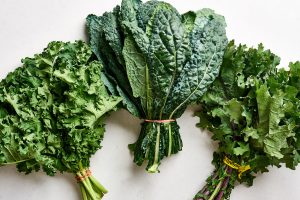 Although Ayurveda can be simple and sensible at times, this medical science can just as easily become a bit confusing when your healthcare needs do not fit into the precise paradigms they have established. There are three specific dosha types (i.e. Vata, Pitta, Kapha) to help guide us in the proper diet and lifestyle choices for our unique constitution; however, many individuals find that they resonate with more than one of these body types. If you have determined that you are predominant in both Pitta and Kapha dosha; are a Pitta type with a Kapha imbalance; or are a Kapha type with a Pitta imbalance, keep reading to discover some dietary guidelines that will nourish and balance both of these doshas together.
Although Ayurveda can be simple and sensible at times, this medical science can just as easily become a bit confusing when your healthcare needs do not fit into the precise paradigms they have established. There are three specific dosha types (i.e. Vata, Pitta, Kapha) to help guide us in the proper diet and lifestyle choices for our unique constitution; however, many individuals find that they resonate with more than one of these body types. If you have determined that you are predominant in both Pitta and Kapha dosha; are a Pitta type with a Kapha imbalance; or are a Kapha type with a Pitta imbalance, keep reading to discover some dietary guidelines that will nourish and balance both of these doshas together.
Pitta and Kapha share the common trait of being oily by nature and therefore foods, drinks, and spices that are considered drying will be beneficial for both dosha types. Since Pitta is hot and Kapha cold, hot spicy foods (which are great for Kapha) will likely provoke your Pitta and cooling foods (which are great for Pitta) will be sure to increase your Kapha. Therefore, it will be best to favor foods and spices that are neutral or warm by nature in order to find a nice middle ground.
Eating with the season may be helpful by following a more Pitta-reducing diet and lifestyle during the summer, and then switching to a Kapha-reducing diet and lifestyle throughout the winter and spring. Alternatively, you may want to put more emphasis on whichever dosha seems to be out of balance at any given moment. If you are still confused or feel there may be imbalance in both areas (i.e. dealing with excessive weight – Kapha, but experiencing hyperacidity – Pitta), then observing a diet that is beneficial for both Kapha and Pitta will be necessary.
Pitta-Kapha Dietary Guidelines
Diet Do’s
- In general, you will want to follow a stricter Kapha-reducing diet in the winter and early spring, and a stricter Pitta-reducing diet in the late spring and summer.
- Eat on a healthy meal schedule: 6-8am: Light but fulfilling breakfast; 11am-1pm: hearty, healthy lunch; 6-7pm: small to medium-size dinner.
- Overall the food choices should be light, but nourishing with high amounts of lean, easy-to-digest protein (fish, chicken, egg whites, mung beans) and fiber (buckwheat, quinoa, veggies).
- Favor foods and beverages with bitter and astringent tastes; these are cooling for Pitta, lightening for Kapha, and drying for both doshas.
- Favor low-sugar fruits that are not sour or acidic such as apples, blueberries, peaches, pears, pomegranate, apricots, and cherries; avoid fruit juice.
- Favor bitter or astringent veggies that are not high in sugar, starch, or water content such as asparagus, bitter greens, celery, broccoli, and cauliflower.
- Favor lighter whole grains such as amaranth, quinoa, buckwheat, millet, and barley.
- Favor lighter, cooling oils such as ghee, sunflower oil, and flax oil; use in moderation only!
- Include lots of warming (not too hot or cold) digestive spices in your meals such as fresh ginger, turmeric, fennel, coriander, cilantro, cardamom, and cumin.
- Limit salt intake which is provoking for both Pitta and Kapha; small amounts of pink Himalayan salt or mineral salt will be best.
- Limit all sweeteners; honey in cooler months and maple syrup in warmer months can be used in small amounts.
- Dairy should be limited to ghee, homemade kefir, homemade yogurt, and goat dairy.
- Drink ginger tea made with fresh ginger, CCF Tea, or warm lime water between meals to aid in digestion.
- Take Triphala Churna, Bhumyamalaki, or Amalaki before bed each night to aid in digestion, elimination, and detoxification.
- When all else fails, find tridoshic foods, spices, drinks, and recipes for fool-proof options!
Dietary Don’ts
- Avoid heating, inflammatory foods such as nightshades, red meat, pork, deli meat, refined carbohydrates, table sugar, high-fructose corn syrup, trans fats, vegetable oil, and alcohol.
- Avoid grazing and snacking.
- Avoid eating after 7pm (6pm in winter).
- Avoid iced and cold beverages.
- Avoid drinking fluids before, during, or directly after meals.
- Avoid heavy grains such as wheat, gluten, and oats.
- Avoid fatty foods, fried foods, unhealthy oils, and excessive oil.
- Avoid processed food, additives, and dyes.
- Avoid improper food combinations (read more here).
While adopting some of these beneficial dietary guidelines, you should also become familiar with the best foods to consume and which foods to limit or avoid. Please remember however, that these food charts are not all black and white. If you love a food on the “limit” list, you can likely enjoy it on occasion, especially if you are feeling in-balance. You can often “cheat” (with awareness and moderation) depending on the season and the context as well. For example, adding some chili pepper to your meal in the wintertime will be much more acceptable than eating a spicy dish in the midst of summer. Therefore, use this chart as a guide and learn where you are able to intelligently play around on occasion.
Pitta-Kapha Food Chart
Click here for a printable version of this chart for your refrigerator!
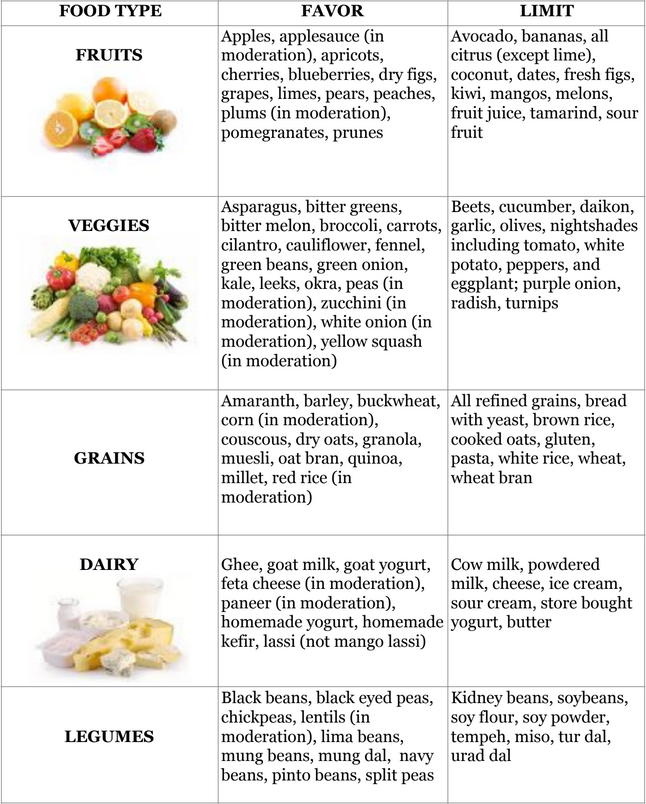
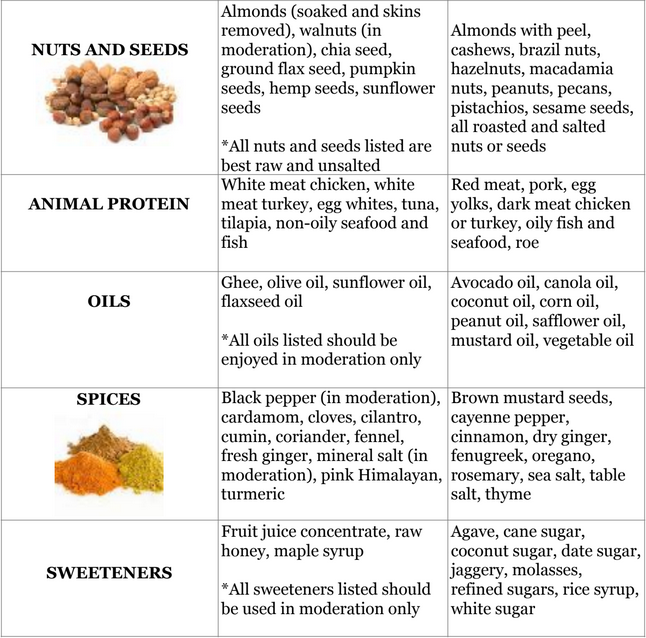
Click here for a printable version of this chart for your refrigerator!
Recipes To Balance Pitta and Kapha
- Breakfast Kitchari Recipe
- Golden Energy Buckwheat Breakfast
- Simply Spiced Quinoa Porridge
- Springtime Breakfast Scramble
- Pitta-Reducing Kitchari (use quinoa instead of basmati rice)
- Deliciously Vibrant Chana and Mung Dal
- Tridoshic Mung Dal and Quinoa Kitchari
- Classic Cleansing Kitchari
- Tridoshic Quinoa and Veggie Stir-Fry
- Black Eyed Peas and Kale Rice Bowl
- Cooling Coconut and Kale Sauté
- Curried Coconut and Veggie Soup
- Coconut Curry Hummus
- Healing Ayurvedic Bone Broth
- Simply Steamed Veggie Recipe
- Masala Chai Recipe
- The Essential Almond Milk
- Homemade Golden Almond Milk
- Amazingly Addictive Homemade Hemp Milk
- Homemade Kefir in 5 Easy Steps
- Quick and Easy Homemade Ghee
Discover more healing recipes with my 30-Minute Ayurvedic Cookbook!

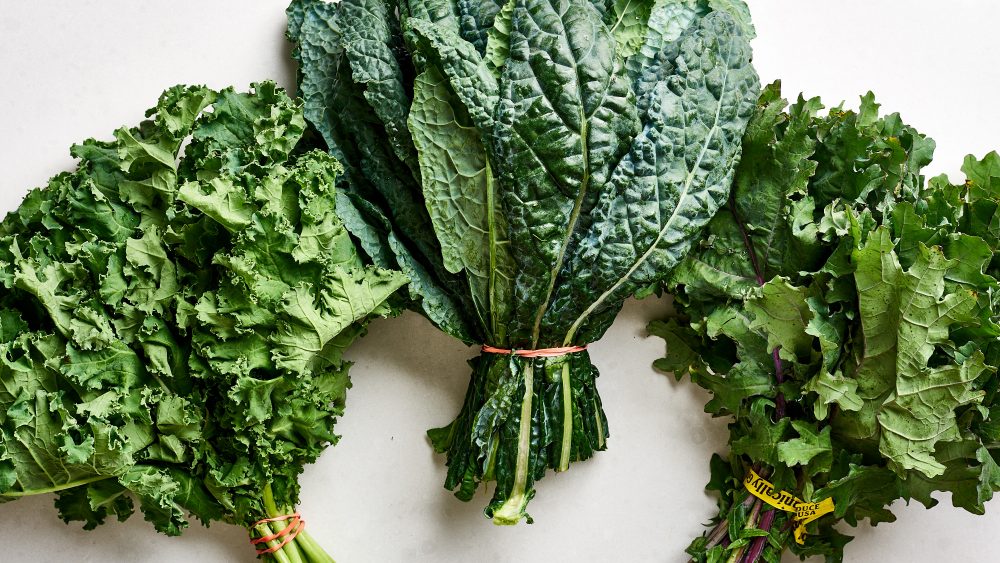
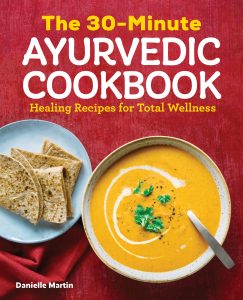

Thanks for the list. I have a question. I have psoriasis extremely bad. I was reading about you ghee. Do you have any suggestions as to how to use the medical ghee and should I try something else. I do realize that food is the biggest problem with the psoriasis.
Any suggestion would be greatly appreciated…
Thanks
Dedre
Hi Dedre,
Thank you for writing in with your questions!
You are correct that diet plays a very important role in psoriasis, as well as stress and other lifestyle factors. The diet will generally need to be Pitta-reducing since Pitta is often a big factor in psoriasis. However, it will be equally important to remove all food allergens (specific for your body), processed foods, additives, dyes, etc; as these types of foods will also be impeding in the treatment of your psoriasis.
In regards to herbal medicine, the Tikta Ghrita is often prescribed in psoriasis and can be taken internally as well as applied externally to the effected area. We also have a new skin oil coming out this fall that is specific for alleviating more severe skin conditions such as psoriasis. Until this is available, I would apply the Tikta Ghrita.
Another effective formula for the treatment of skin conditions is called Mahasudarshana Churna. This is a very bitter powdered formula, but has been helpful for many individuals in their healing process with various skin disorders.
I hope this helps my friend! Many blessings to you!
Namaste,
Danielle
Thank you for your response. I’m ordering the mahasurarshan Churns and the ghee. I will let you know how my body responds.
That is great Dedre! Please do keep me posted and let me know if any questions come up otherwise.
Many blessings,
Danielle
I am a Pitta Kapha dosha. Stage four cancer which metastasis into the liver left me with only the option of target and immunotherapy. The therapy was very quickly and highly successful as it reduced the tumors by over 80 percent and they can now be surgically removed. Work stressors which were extremely high over 20 years no longer exist as I am now retired.
The side effect of the therapy is that my body is covered with eczema type rashes that are persistent and impact my sleep and overall wellness. The constant itching also impacts my energy level.
Hi Dagmar,
Thank you for sharing your story. I am happy to hear your treatment was successful overall, but I am sorry you are left with other health issues affecting your wellbeing.
Once you are free from cancer (post-surgery) and you have given time for your body to heal, you may benefit from seeing an Ayurvedic practitioner to help detox your body and rejuvenate your tissues. Until then eating a very pure, whole food, and healthy diet free from chemicals, processed foods, and prepackaged foods will be very beneficial. Therapies to produce stress-relief will also be essential (e.g. meditation, restorative Yoga, pranayama, nature walks, resting, etc).
It is necessary to avoid herbs until your doctor says it is safe, but in the meantime, using spices such as turmeric, cilantro, fennel, coriander, cumin, cinnamon, and ginger in your food and herbal teas could be useful for your conditions. You can also try Golden Milk or Golden Almond Milk before bed to help with sleep.
Sending you love and healing energy for a safe recovery!
Namaste,
Danielle